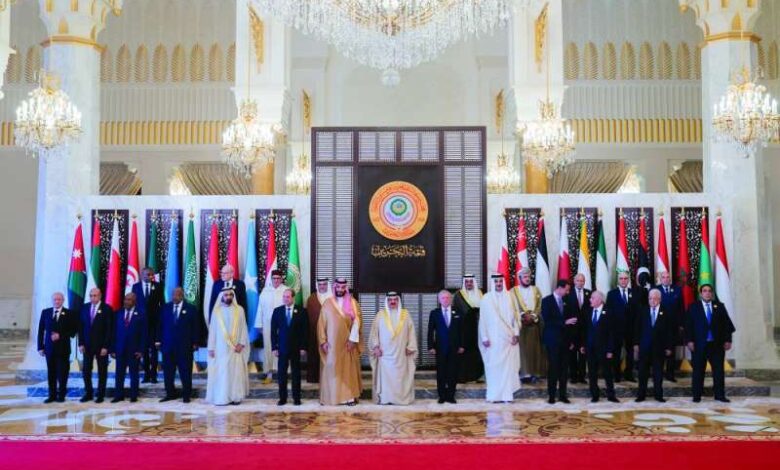Bahrain Declaration calls for UN forces in Palestine until two-state solution
The declaration emphasizes the goal of living in security and peace alongside Israel, in accordance with international legitimacy resolutions and adopted terms of reference, including the Arab Peace Initiative.

• The Bahrain Declaration strongly condemned “Israel’s obstruction of ceasefire efforts in the Gaza Strip and its persistent military escalation by expanding aggression against the Palestinian city of Rafah, despite international warnings of catastrophic humanitarian consequences.”
The Bahrain Declaration, issued at the conclusion of the Arab Summit, calls on the international community to fulfill its responsibilities in advancing the peace process. This aims to achieve a just and comprehensive peace based on the two-state solution, which includes the establishment of an independent Palestinian state with East Jerusalem as its capital along the lines of June 4, 1967. The declaration emphasizes the goal of living in security and peace alongside Israel, in accordance with international legitimacy resolutions and adopted terms of reference, including the Arab Peace Initiative.
It also called for the deployment of international protection and peacekeeping forces of the United Nations in the occupied Palestinian territory until the implementation of the two-state solution. It stressed “the responsibility of the Security Council to take clear measures for the implementation of the two-state solution, emphasizing the need to set a time limit for the political process and issue a Security Council resolution under Chapter VII to establish an independent, sovereign, viable, and contiguous Palestinian state, based on the lines of June 4, 1967, with East Jerusalem as its capital, and to end any presence of occupation on its territory. Israel is held responsible for destroying cities and civilian facilities in the Gaza Strip.”
The leaders expressed their “appreciation for the good efforts made by the Kingdom of Saudi Arabia during its presidency of the thirty-third Arab summit and the endeavors it is making to unite efforts, support joint Arab action, strengthen regional security, and defend the interests of Arab countries and their peoples.”
They stressed “the need to immediately stop Israeli aggression on the Gaza Strip, the withdrawal of Israeli occupation forces from all areas of the Strip, the lifting of the siege imposed on it, the removal of all obstacles, and the opening of all crossings for the entry of sufficient humanitarian aid.” They reiterated “the categorical rejection of any attempts to forcibly displace the Palestinian people from their land in the Gaza Strip and the West Bank, including East Jerusalem,” while calling for “urgent measures for an immediate and permanent ceasefire, an end to aggression in the Gaza Strip, the provision of protection for civilians, and the release of hostages and detainees.”
Refuse to be displaced
They strongly condemned “Israel’s obstruction of ceasefire efforts in the Gaza Strip and its persistent military escalation by expanding aggression against the Palestinian city of Rafah, despite international warnings of catastrophic humanitarian consequences.”
Furthermore, they condemned “Israeli forces’ control of the Palestinian side of the Rafah crossing, aiming to tighten the siege on civilians in the Gaza Strip. This control has led to the cessation of the crossing’s operations, the halt of humanitarian aid flow, and the loss of a vital lifeline for Gazans. We demand that Israel withdraw from Rafah to ensure safe humanitarian access.”
The leaders emphasized “the firm and supportive Arab position on the Palestinian cause, which is central to peace and stability in the region. We categorically reject all attempts to displace the Palestinian people within or outside their land, as it constitutes a clear violation of international law. We are committed to addressing this issue collectively.”
Palestine Liberation Organisation
Appreciating “the positions of the countries that have recognized the Palestinian state and announced their intention to recognize,” the leaders called on “all Palestinian factions to unite under the umbrella of the Palestine Liberation Organization, the sole legitimate representative of the Palestinian people. They urged the factions to agree on an inclusive national project and a unified strategic vision.”
The Golan and southern Lebanon
They also called on “the international community to fulfill its legal obligations and take decisive action to end the Israeli occupation of the occupied Arab territories since June 1967, including the occupied Syrian Golan Heights and southern Lebanon, and to implement the relevant Security Council resolutions.”
Return of Syrian refugees
The leaders reaffirmed “the need to end the Syrian crisis in a manner consistent with Security Council Resolution 2254, preserving Syria’s security, sovereignty, and territorial integrity, fulfilling the aspirations of its people, eliminating terrorism, and facilitating the dignified, safe, and voluntary return of refugees. We reject interference in Syria’s internal affairs and any attempts to alter its demographics.”
They stressed “the necessity of creating conditions to enable the dignified, safe, and voluntary return of Syrian refugees to their homeland, including the lifting of unilateral coercive measures imposed on Syria.”
The leaders of Arab countries praised the “Bahrain Declaration” by His Highness the Amir, Sheikh MeshalAl-Ahmad Al-Jaber Al-Sabah. They conveyed their best wishes for His Highness’s success and the well-being, growth, and prosperity of the people of Kuwait. Additionally, they expressed condolences to Kuwait and its brotherly people on the passing of the late Sheikh Nawaf Al-Ahmad, the former Amir of Kuwait. May his soul rest in peace.
International conference on Palestine
The leaders welcomed Bahrain’s proposal to issue a collective invitation to hold an international conference under the auspices of the United Nations, aimed at resolving the Palestinian issue based on the two-state solution.
Supporting Lebanon’s sovereignty
The leaders affirmed their support for Lebanon’s sovereignty, stability, and territorial integrity. They urged “all Lebanese parties to strengthen the functioning of constitutional institutions.”
Sovereignty of the UAE
The leaders stressed “the sovereignty of the United Arab Emirates over its three islands (the Greater Tunb, the Lesser Tunb, and Abu Musa)” and called on Iran “to respond to the UAE’s initiative to find a peaceful solution to this issue.”
Condemning militias
The Bahrain Declaration reaffirmed “the complete and strong rejection of any support for armed groups or militias that operate outside the sovereignty of states and pursue or implement foreign agendas that are contrary to the supreme interests of Arab countries.”
Freedom of maritime navigation
The leaders of Arab countries affirmed “their adherence to freedom of maritime navigation in international waters in accordance with the rules of international law and agreements of the law of the sea. They also emphasized ensuring freedom of navigation in the Red Sea, the Arabian Sea, the Sea of Oman, and the Arabian Gulf.”Additionally, they condemned “the severe exposure of commercial ships.”













